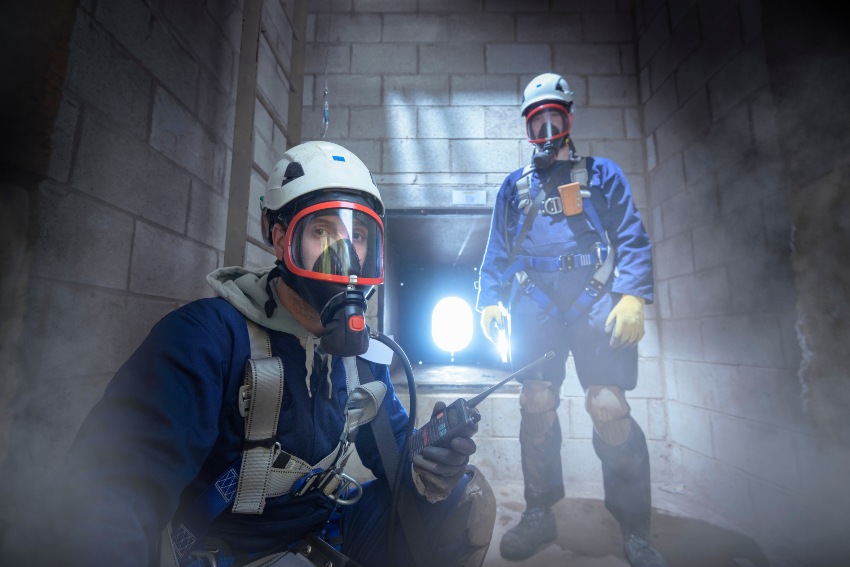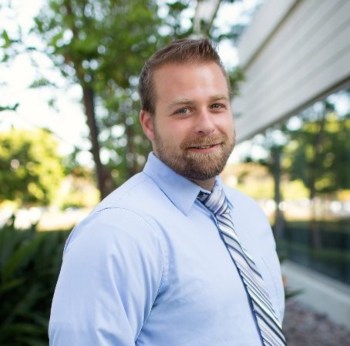By Stephanie Stevens

Name: Derek Duval
Occupation: Fire Protection Engineering Consultant
Education: Bachelor of Science in Mechanical Engineering and Master of Science in Fire Protection Engineering, both from Worcester Polytechnic Institute; Registered Professional Engineer in Fire Protection in California and Massachusetts; Certified Designated Design-Build Professional
Courses Taught: Principles of Fire Protection Engineering, Building Code and Life Safety and Fire Protection System Design
Derek Duval has always wanted to help others. And while he never developed any cosmic superpowers, he did discover that he has a special ability. He can see the big picture on every engineering project he takes on and use that knowledge to save lives. He says that he found his passion when he discovered fire protection engineering as a career.
What was your initial career plan before college?
Growing up, I was fond of building anything I could imagine out of Legos. In high school, I excelled in math and science, so I joined the robotics club and became involved in all the aspects of designing and building them. The components, wiring, programming, and understanding how to accomplish the “task”. I could never settle for being assigned to just one of the tasks because I understood the big picture and the need for all of the pieces to work together. I decided when I went to college that I was going to build robots and be exposed to all aspects of engineering.
How did you develop an interest in public safety?
I’m not sure where my interest began, but at an early age I was always wanting to help others. When I was young, I was into comics and superheroes. There was something about these characters who would use their extraordinary skills and abilities to save and help others. It really resonated with me — these characters with such great power who use it for the protection of others rather than personal gain. That’s followed me throughout my life and now I use my skills to protect the general public, buildings and first responders from fires.
When did you learn about Fire Protection Engineering and what was your first impression of the career?
During freshman orientation, there was an information session that included a discussion about all the different engineering fields offered by Worcester Polytechnic Institute. One of the students was in the five-year master’s program for fire protection engineering.
The student presenter also shared that having knowledge of mechanical systems, electrical systems, chemistry, mathematics, and computer modeling is essential for fire protection engineering. I became intrigued. I saw this as a perfect fit for me. Not only was I interested in all aspects of engineering, math, and science, but now I would have the skills to protect people from fire and its effects. I had no idea that a career like this existed before college. After that, I applied to be in the program and the rest is history.
 What is the most common mistake people make when asking about your profession?
What is the most common mistake people make when asking about your profession?
The most common response is “oh you design fire sprinkler systems.” While there are individuals that specialize in just designing fire sprinkler systems, the field of fire protection engineering encompasses much more. It includes understanding how fire develops and spreads through buildings, how people react in emergencies, how building materials react to fire, and how responding fire departments attack a fire. Fire protection engineers apply this knowledge to design fire protection systems that can include fire sprinkler systems, fire alarm and detection systems, smoke control systems, fire-rated assemblies, and exiting and egress systems. We also use this knowledge to develop computer models to predict fire behavior to design more efficient protection systems. Some fire protection engineers work for testing laboratories conducting fire tests on materials and new suppression techniques. Additionally, we need to understand how other building systems work and how they should respond in emergencies.
How does your job relate to fire fighters?
We have to understand how firefighters respond to fires as part of the design and construction of the overall fire protection plan for buildings and facilities. These heroes have to go into burning buildings and structures, so we have to ensure that if these buildings ever have a fire event people can get out safely, the building damage is limited, and that first responders are protected and have the tools they need to adequately fight the fire.
What kind of person would be most successful in this profession? What technical and interpersonal skills do they need?
Someone who is interested in all aspects of engineering and sciences. It requires teamwork as you have to coordinate and understand many aspects of building construction to be a good fire protection engineer. Being able to communicate clearly and concisely is also very important in this field, as we have to daily deliver information to many who may not understand fire and its effects.
Tell us about your current job.
Currently, I work as a fire protection engineer consultant for Coffman Engineers. In this role, I am exposed to most aspects of the fire protection engineering field which is what I love about it.I work with architects, general contractors, other engineering firms, building owners, building officials, fire marshals, and real estate developers.
Additionally, my current position allows me to be a part of the building/fire code and standard development through committee work. That work is important to me as these are the codes to keep us safe.
What’s a typical day like for a Fire Protection Engineer?
It varies from day to day. Some days I am in the office, others I am out in the field inspecting buildings and verifying building conditions. Some fire protection engineers go into the insurance industry having to evaluate existing facilities and hazards to determine the extent of insurance coverage, others go into research and testing laboratories testing new building materials and equipment.
Why is there more demand in this field than before?
There has always been a demand for this field but there are only a few colleges and universities that offer a specialized degree in Fire Protection Engineering and related degrees. This means that many in the industry may not have had the initial background and had to learn through on the job training.
I suppose there is more of a demand now as buildings are becoming more complex and require coordination between different building systems all while ensuring that these buildings and facilities are protected from fire.
What do you wish everyone knew about fire safety and protection?
That it is a joint effort. It is not any single individual creating a safe building and protecting you from fire. Many of the building codes and regulations were based on major disaster events, we are slowly moving beyond the “design by disaster” mentality and more based on science and knowledge, but it takes more individuals to gain an understanding of this field to do so.
Any advice for those interested in pursuing this certificate about the benefits or considerations?
You don’t have to be already in the field, you don’t have to want to go into specialty fire consulting to gain benefits from this course. Anyone who is in building design and construction will benefit from understanding how the building and fire codes shape our cities. Having this understanding of fire will allow us to design safer, more efficient, less expensive buildings and structures.
This interview was edited for length.
Want to know more? We now offer a specialized certificate program in Fire Protection Engineering.